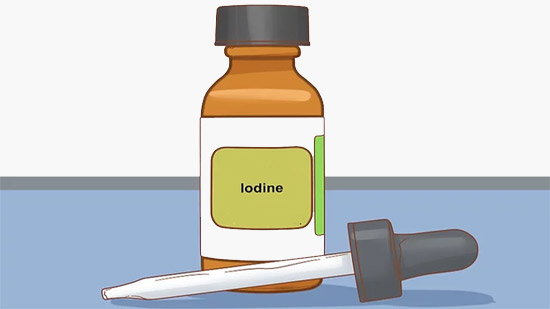 Iodine is largely used as an antiseptic and disinfectant; and is an important component in making catalysts, animal feed supplements, photography chemicals, inks and dyes, and pharmaceutical industries. Iodine is also an important element needed for life. Iodine is best known for its crucial role in the production of thyroid hormone and fetal development in humans and vertebrates. Due to thyroid deficiency, a person can suffer from serious health issues like goiter, cretinism, and intellectual disability.
Iodine is largely used as an antiseptic and disinfectant; and is an important component in making catalysts, animal feed supplements, photography chemicals, inks and dyes, and pharmaceutical industries. Iodine is also an important element needed for life. Iodine is best known for its crucial role in the production of thyroid hormone and fetal development in humans and vertebrates. Due to thyroid deficiency, a person can suffer from serious health issues like goiter, cretinism, and intellectual disability.
Iodine is a kind of mineral found in ocean waters and earth’s soil. It is produced from iodine-containing brines, which are extracted from the oil wells containing approximately 150 mg per liter of iodine. These brines are found in China, Japan, northern Italy, California, Java, Chile, Azerbaijan, and Russia. Impurities like clay, oil, and sand are eliminated by filtration, and after that, the solution is passed through numerous processes until iodine is obtained.
Iodide, for a long time, has been recovered on a commercial scale from seaweed, which is dried, burned, and the ash is leached using water. Then, sodium chloride and sodium sulfate are eliminated through crystallization, and the rest of the solution is concentrated by water evaporation. The final solution that contains 30-100 grams/liter of iodine is treated with sulfuric acid. Finally, manganese dioxide and sulfide are added for releasing iodine.
Since the production of iodine is so complicated and limited to only a few countries, buyers are always looking for crude iodine so that they can use it further in pharmaceutical and other industries. Iodine is an essential mineral required by our bodies. It is specifically important during pregnancy as it helps prevent the development of certain diseases. The benefits of iodine for human bodies are as follows.
-
Maintaining Thyroid Health
The thyroid is a hormone produced by the thyroid gland that controls your heart health, metabolism, and more. Your gland uses iodine in small quantities for thyroid hormone production. Due to deficiency of iron, thyroid hormone production may decrease and lead to hypothyroidism. You can get a sufficient amount of iodine by eating fortified foods, iodized salt, saltwater fish, and dairy products.
-
Managing Overactive Thyroid Gland
If your thyroid gland is overactive, you may be prescribed a specific iodine type known as radioactive iodine by the doctor to treat the overactive gland. Also known as radioiodine, this medicine is taken orally and it is used to damage extra thyroid cells to decrease excessive thyroid hormone. However, radioactive iodine can destroy a significant amount of thyroid cells, which can lead to decreased production of thyroid. This could eventually cause hypothyroidism.
-
Reducing Risk For Goiters
An enlarged thyroid gland is known as goiter. The gland can be enlarged because of hyperthyroidism (overactive thyroid gland) or hypothyroidism. Some non-cancerous thyroid cysts can also lead to enlargement of the thyroid gland. Goiter can develop due to iodine deficiency but can be treated by adding supplements of iodine or foods rich in iodine to the diet.
-
Neurodevelopment In Fetuses
During pregnancy, more iodine is required. This is because iodine intake during the pregnancy term is linked to the development of the brain in fetuses. For a non-pregnant adult, the recommended intake is 150 mcg per day but in the case of pregnant adults, the daily intake should be 220 mcg. Even for breastfeeding mothers, consuming 290 mcg iodine each day is recommended. This is because the baby would get iodine from the breast milk, and this period is a critical brain development period.
Furthermore, these neurological benefits can support healthy brain functioning in childhood. This includes a decreased risk of intellectual disability as well. A child generally gets the required iodine from their diets. However, if you have any doubts about their iodine intake, consult a pediatrician.
-
Disinfecting Water
Iodine can be used to disinfect water. If you do not have potable water because of a natural disaster or during traveling, using iodine can be helpful. You can use liquid iodine tincture to the water or put on iodine tablets. However, doing so is recommended only during an emergency because if you put iodine in water, your total iodine intake may exceed the recommended amount and cause adverse health effects.
-
Treating Infections
Iodine is used in a liquid form to help treat as well as prevent infections by killing bacteria around and in mild cuts and scrapes. But you should not use topical iodine on newborn babies. You should not use it for animal bites, burns, or deep cuts as well. You should follow the direction printed on the packaging and must not use it for more than ten days unless you are directed by your doctor.
The Bottom Line
Iodine is amongst the essential minerals required by a human body. But it should not be consumed in excess and if you feel you suffer from iodine deficiency, consult a doctor before you introduce iodine supplements to your diet. In excessive consumption, iodine can be toxic for you.




